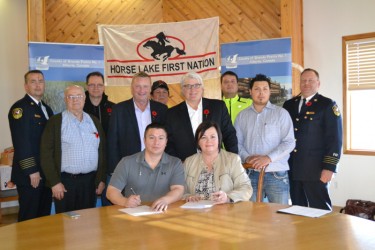Article Origin
Volume
Issue
Year
Those living on a First Nations reserve are 10 times more likely to die in a house fire than those living in the rest of Canada, according to a 2010 federal study. Horse Lake First Nation Chief Administrative Officer Darwin Eckstrom heard this sobering statistic while listening to a CBC broadcast last March and knew he had to do something to change it.
This November, Horse Lake First Nation and the County of Grande Prairie entered into a two-year partnership that will bring advanced fire fighting skills and training to the volunteer fire fighters in Horse Lake.
“That was the genesis of it,” Eckstrom said of the CBC broadcast that motivated him. “They talked about the likelihood of dying in a fire on a reserve. It would make you cry, hearing about kids dying in a house fire because the trucks couldn’t make it in time.”
Eckstrom contacted the nearby County of Grande Prairie to see if their Regional Fire Services department would provide training at the fire hall in Horse Lake. He also approached the Alberta government about offsetting the costs for training through the First Nations Development Fund.
Less than a year later, the official memorandum of understanding was signed.
Over the next year and a half, Horse Lake fire fighters—who have not received formal training since 1996—will be trained weekly in the skills and standards of the National Fire Protection Association Level 1 firefighting course. The course teaches fire safety practices and the standards for fighting structural and wild land fires, as well as for responding to motor vehicle collisions.
“Currently (the Horse Lake volunteer fire fighters) are the primary responders to any emergency that occurs in the Horse Lake boundary,” said Everett Cooke, fire chief with the County of Grande Prairie and coordinator of the training program. “This training will improve the safety of the Horse Lake fire department when they respond to emergencies—that was the first and foremost goal. And, of course, it will allow them to provide efficient emergency response service, both on and off the reserve.”
The province pledged $53,000 to cover training for the next year, according to Alberta’s Aboriginal Relations. Eckstrom plans to apply for more funding to help upgrade equipment and infrastructure at the Horse Lake fire hall. The 12 fire fighters slated for training will be outfitted with all-new equipment from helmets and gloves to boots and coats, replacing old equipment that didn’t meet 2014 standards. Eckstrom also hopes to secure funding to continue training to NFPA Level 2—something Cooke hopes will happen as well.
“Once our fire fighters have been trained, they’ll know what to expect, and they’ll know how to intervene. This is going to be better for the safety of the whole community and for the people fighting the fires,” Eckstrom said.
- 1052 views

